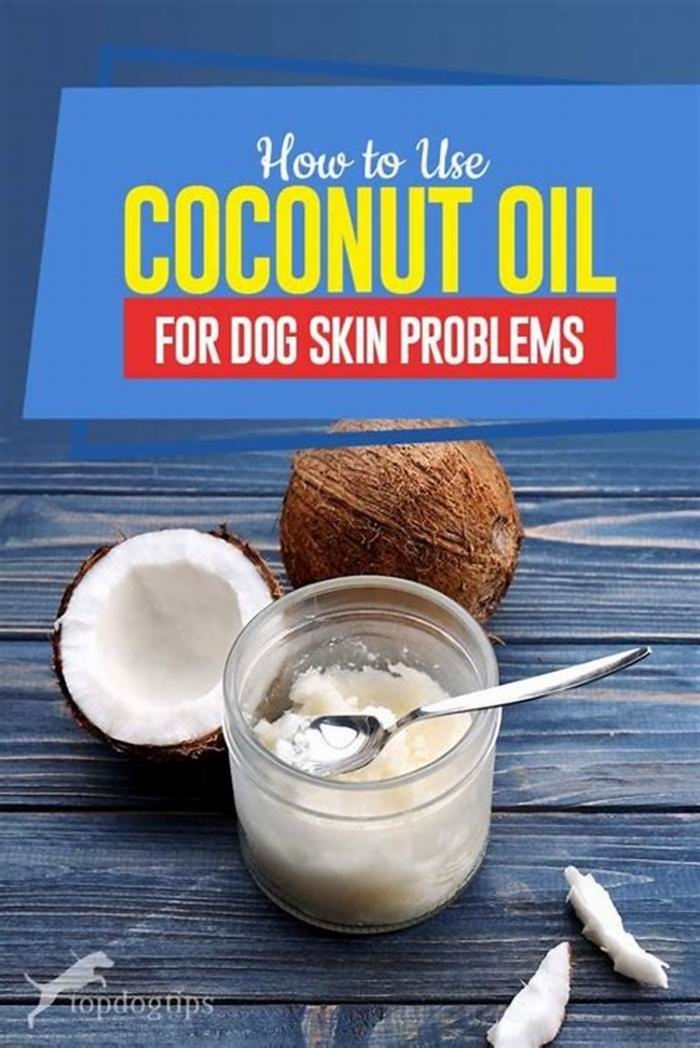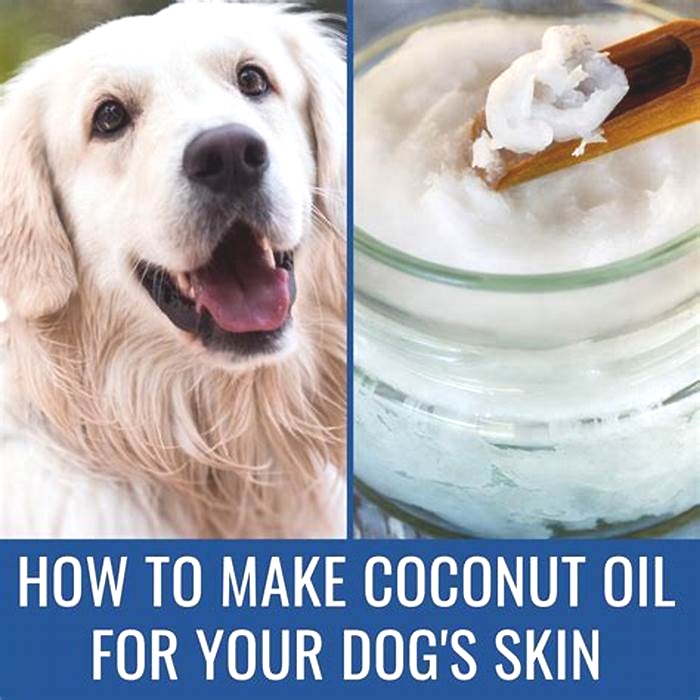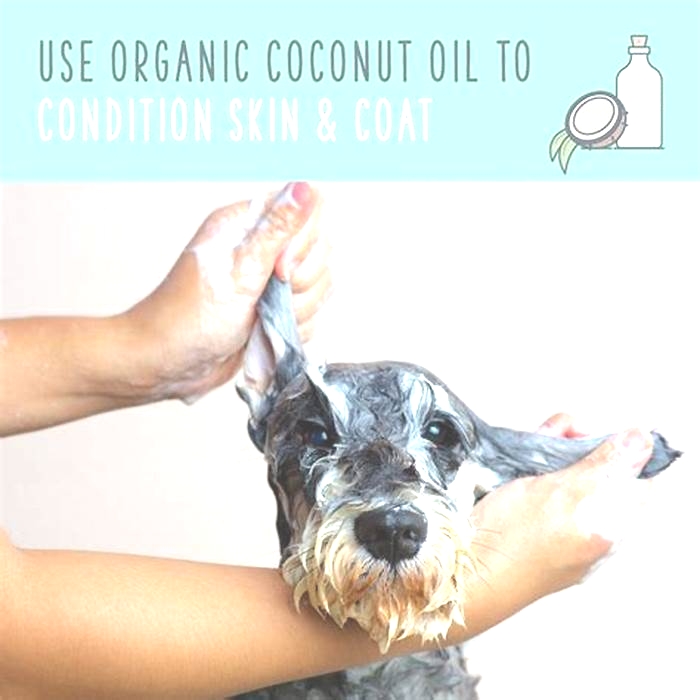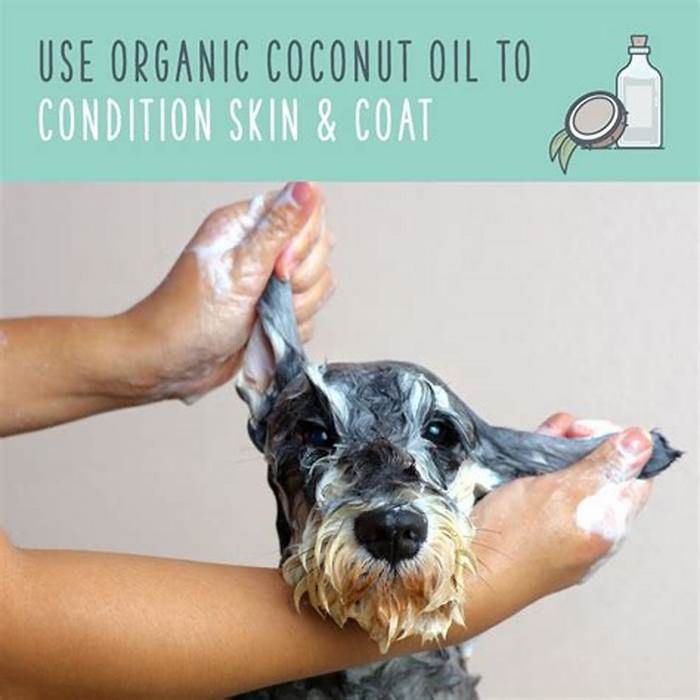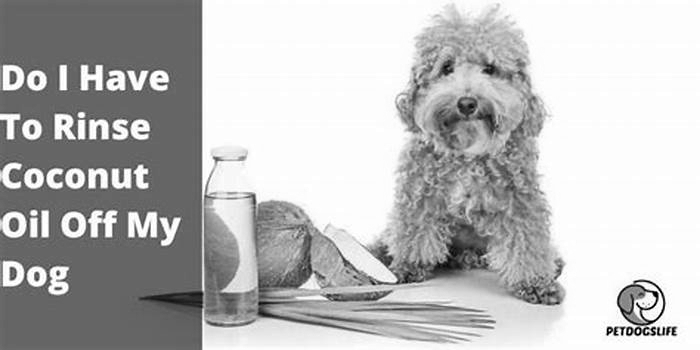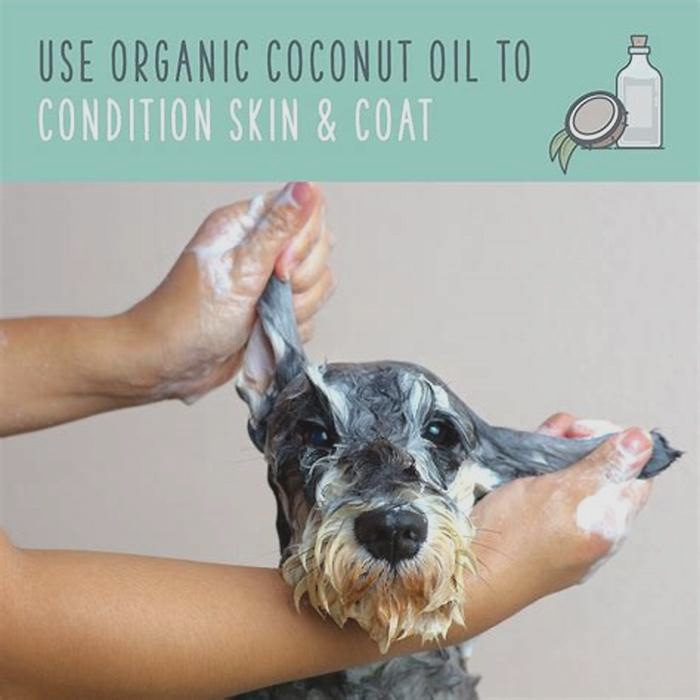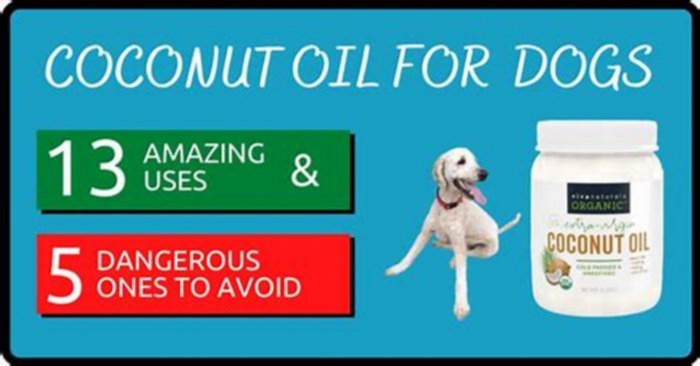What happens if you rub coconut oil on your dog
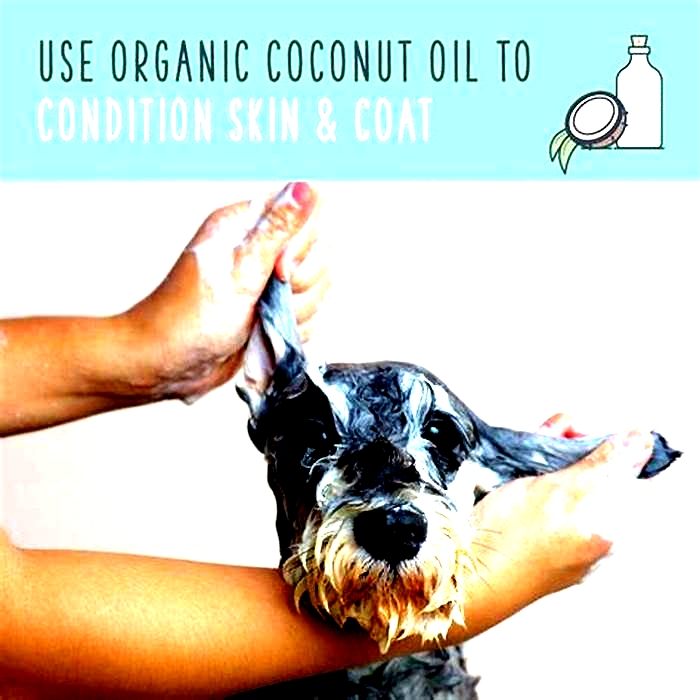
Can I Use Coconut Oil On My Dog?
Coconut oil has a lot of health benefits for humans, so you might be wondering if its good for dogs, too. The short answer is yes! Coconut oil can be beneficial for your dog in many ways.
When applied to the skin, coconut oil can help heal wounds and hot spots, and it can also help relieve itchiness from dry skin or allergies. Coconut oil can also be used as a natural flea and tick repellent. Just rub a small amount into your dogs fur before going for a walk in areas where these pests are common.
If your dog suffers from dandruff or dry, brittle hair, regular applications of coconut oil can help improve the condition of his coat. And like humans, dogs can also benefit from coconut oils anti-inflammatory properties when taken internally.
How To Use Coconut Oil On Dogs?
- Place a small amount of coconut oil in your palm
- Rub the oil into your dogs coat, working it in from the tips of their fur to the roots
- Focus on any dry or flaky areas, as well as any particularly matted patches of fur
- Once youve evenly distributed the oil throughout your dogs coat, use a brush to work it in further and remove any excess oil
- Allow your dog to air dry, or towel them off if theyre impatient
Is Coconut Oil Safe for Dogs Skin?
Coconut oil is generally safe for dogs to use topically.
However, as with any new product, its always best to do a patch test first to make sure your dog doesnt have any adverse reactions. Simply apply a small amount of coconut oil to an area of their skin and wait 24 hours to see if theres any redness, swelling, or other irritation. If your dog does seem to be tolerate coconut oil well, then you can start using it more regularly.
Just be sure not to go overboard a little goes a long way! You can apply it directly to their skin or add it into their food. Coconut oil can also help relieve dry, itchy skin and promote healing of minor wounds.
So overall, yes coconut oil is safe for dogs and can offer many benefits for their skin and coat health. Just introduce it slowly and watch for any negative reactions before using liberally.
Does Coconut Oil Help Dogs Itchy Skin?
There is no one definitive answer to this question since each dogs individual needs will differ. However, some pet owners report that coconut oil can help soothe their dogs itchy skin when applied topically. Additionally, coconut oil contains lauric acid which has antibacterial and antifungal properties, making it beneficial for treating certain skin conditions.
If you are considering using coconut oil for your dogs itchy skin, be sure to consult with your veterinarian first to determine if it is the right option for your pet.
Can I Put Human Coconut Oil on My Dog?
Yes, you can put human coconut oil on your dog. There are a few things to keep in mind, however. First, coconut oil is solid at room temperature, so youll need to melt it before applying it to your dog.
Second, coconut oil can be a bit greasy, so be sure to rub it in well. Third, Coconut oil has antibacterial and antifungal properties, so its great for treating skin conditions like hot spots or dry patches. Finally, always check with your veterinarian before using any new products on your dog.
How Much Coconut Oil Should I Rub on My Dog?
There are a lot of benefits to using coconut oil on your dog, but how much should you use? It really depends on the size of your dog and the condition of their skin/coat.
For a small dog, you would only need to use 1/4 teaspoons per day. For a medium sized dog, 1 teaspoon per day would be sufficient. And for large dogs, up to 1 tablespoon per day can be used. If your dog has dry skin or a dull coat, you may need to increase the amount you use until their condition improves.
You can apply the coconut oil directly to their skin/coat or add it to their food. Start with smaller amounts and increase as needed.
Can Dogs Lick Coconut Oil?
Yes, dogs can lick coconut oil. In fact, many dog owners use coconut oil to help improve their dogs health in a number of ways. Coconut oil is rich in healthy fats that can help to boost your dogs energy and immunity, and it also has anti-inflammatory properties that can help to reduce any skin conditions or allergies.
Can I Put Coconut Oil on My Dogs Paws?
Yes, you can. Coconut oil can help to soothe dry and irritated skin, and can also help to protect against environmental damage like cold weather. Its also great for keeping your dogs coat healthy and shiny.
But before you start slathering coconut oil all over your pup, there are a few things to keep in mind. First, make sure youre using pure, unrefined coconut oil the kind you would use for cooking. Second, always test a small patch of skin first to make sure your dog isnt allergic.
And finally, dont go overboard a little bit of coconut oil goes a long way.
Find Out Whether You Can Use These on Your Dog
Conclusion
Yes, you can use coconut oil on your dog. There are many benefits to using coconut oil on your dog, including: helping to keep their skin and coat healthy, reducing inflammation, and boosting their immune system. Coconut oil is also great for dogs who have allergies or sensitive skin.
Coconut Oil for Cats: Is It a Good Idea?
Benefits of Coconut Oil for Cats
Using coconut oil for cats can have multiple benefits, says Dr. Anna Gardner, a holistic veterinarian in Washington. Externally, Gardner says coconut oil can help with allergies, dry skin, itchiness, and overall coat health. Internally, coconut oil can benefit a cats immune system, help with hairballs, reduce arthritis inflammation, improve bad breath, and help with a healthy stomach, she says.
Dr. Jeffrey Stupine, VMD, head veterinarian for wellness at the Pennsylvania SPCA, doesnt recommend giving coconut oil on a regular basis, but he says his colleagues have seen it offer such benefits as treating dermatitis.
How to Give Cats Coconut Oil
You can use small amounts of coconut oil with food or apply it topically for cats with skin problems, Gardner says. But, as with any new food or supplement, dont give your cat too much coconut oil too soon.
I would introduce it slowly because, like anything, some cats tolerate it better than others or the cat could be allergic to itwhich is rare but happens with any dietary supplement, Gardner says. Also adding too much too fast could cause diarrhea.
For an average-size cat, give to teaspoon once or twice a day, Gardner recommends. Other vets recommend starting with as little as 1/8 of a teaspoon daily. Gardner says that cat owners who want to use coconut oil to treat or prevent hairballs can give it less often, such as a few times a week. Overall, she notes that you should start small and adjust amounts as necessary.
As for how to get your cat to eat the coconut oil, Gardner says that shouldnt be a problem unless you have a particularly picky cat: It can be given directly, as a lot of cats like the taste, she says. If your cat wont eat coconut oil on its own, try mixing it with a tablespoon or two of especially pungent, canned cat food.
Risks of Coconut Oil for Cats
While coconut oil does have some benefits for cats, its important to note that the ASPCA has it on their list of People Foods to Avoid Feeding Your Pets, saying that it probably wont cause much harm, but could result in upset stomachs or diarrhea.
Gardner agrees that there could be risks.
Since it is high in saturated fats, I would be cautious using it in cats with pancreatic inflammation, and some cats can be sensitive to it, she says.
Stupine also worries about the risk of pancreatitis and says that the use of coconut oil for cats should be monitored carefully.
Coconut oil is also very high in calories. Youll need to cut back elsewhere in the diet to avoid unwanted weight gain if you start feeding your cat coconut oil.
Alternatives to Coconut Oil for Cats
If your cat wont tolerate coconut oil, there are alternatives to consider. In fact, Stupine says that coconut oil seems to be used in a manner similar to fish oil, though coconut oil doesnt have the Omega-3 fatty acids found in fish oil.
Gardner says that fish oil and topical olive oil can be good alternatives, though ideally they would be used together to maximize fatty acids.
I usually recommend fish oilincluding salmon, anchovy, krill. These have some similar benefits, but not topically, she says. Topically, olive oil can help with skin issues but this does not have the same anti-inflammatory effects as coconut oil. These supplements have some overlap with coconut oil but they don't have the same effects.
Keep in mind that all cats are different and your veterinarian can help you determine if the benefits of using coconut oil with your cat outweigh the risks.
Image:MaraZevia Shutterstock
Do I Have To Rinse Coconut Oil Off My Dog? 5 Answers
Coconut oil has majestic powers that can heal your dogs skin.
It can also aid in your dogs shedding problem.
Now, using it topically is easy
But theres one question that many seem to ask
When you use it, do you have to rinse the coconut oil off your dog?
Continue reading to discover:
- If you can leave coconut oil on your dog overnight.
- What can happen if you leave coconut oil on your dog.
- Whats the best coconut oil to use on your dog (and where to buy it).
- And many more
Do I have to rinse coconut oil off my dog?
You have to rinse coconut oil off your dog. If you dont, itll make your dog greasy, and they become more prone to getting dirty. It can also clog their pores. So, you must rinse it after letting the oil sit for 5 minutes. You can also use shampoo with organic coconut oil for even better results.
What happens if I leave coconut oil on my dog?
If you leave coconut oil on your dog, the grease might make them dirty.
Thats because coconut oil is a substance filled with moisture.
According to research, its moisturizing properties help aid humans with xerosis. Its a condition where youll experience chronic dryness of the skin.
And although focused on humans, vets assure dog parents that it has the same effects on canines.
Coconut oil is also used as a home remedy for a dogs shedding problem.
However, the amount of moisture it has can be a real culprit in making your dog greasy
Then, that greasiness makes your dog sticky.
So, if your pooch wanders around with coconut oil in their coat
Uh-oh
You can expect dirt to stick to them easily.
Afraid that your dog might try to lick the oil off?
Sometimes, dog parents ask if they need to rinse the oil off because of this:
Some are worried about what will happen if their dog tries to lick the oil off.
What will indeed be the consequence for such?
The answer is
None!
Let me assure you that coconut oil is edible for dogs.
In fact, vets from PetMD say that giving it to your pooch can help improve their digestion.
Thats why you can add coconut oil to your dogs food once or twice a day. Heres exactly how much:
| Size of the dog | Daily coconut oil intake |
| Small | 1/4 teaspoon to 1 teaspoon daily0.04 oz (1 mL) to 0.17 oz (5 mL) |
| Large | 1 tablespoon0.5 oz (15 mL) |
With that, you wont have to worry about poisoning if they lick it from their coat.
However, this still doesnt mean that you can leave the oil and not rinse it.
Thats because
Oiliness might lead to dandruff
In dogs, theres this condition called seborrheic dermatitis.
According to VCA Hospitals, its a skin disorder where the skin produces too much sebum.
Whats that?
Its just another word for oil.
Now, your dog wont develop that condition when you dont rinse off the oil in them. Thats because this condition manifests on its own.
So, I present this disorder as it leads to the same consequence
Not rinsing your dog after putting coconut oil in them can lead to them getting dandruff.
With that, instead of the oil making their coat and skin healthy
Oh, no
The opposite happens, and your dog develops a skin problem.
Moreover, those issues cause your dog to constantly scratch and bite themselves. With that, more harm is done to your canines skin.
Continue reading: Does Coconut Oil Really Help With Dog Shedding? The Truth
How long can I leave coconut oil on my dog?
You can leave coconut oil in your dog for no more than 5 minutes.
To elaborate, lets first go a few steps back
Let me start by discussing how to apply it to your pooch.
Now, begin by rubbing a reasonable amount, at least a teaspoon, of coconut oil onto your hands.
Then, lightly dab your dogs coat with oil and run your fingers through their fur.
Once youve covered enough area, massage the leftover oil on their skin.
After that, the waiting begins
And while you do, dont distress about your pooch trying to lick it off. As I said, coconut oil is edible for dogs.
When the 5-minute mark hits, its time to rinse your pooch.
In doing so, you can clean them with just water.
However, if they still feel greasy, following up with a light shampoo wont be a problem.
Moreover, itll be better if the shampoo you use is made with organic coconut oil.
Can I leave coconut oil on my dog overnight?
You can leave coconut oil on your dog overnight, but its advised not to. You still must rinse the oil off the next day if you do.
First of all, its a good habit to put coconut oil on your dogs coat.
Now, some dog parents practice leaving it on their dogs overnight.
But let me tell you, doing so is only fine when you rinse it off your pooch the next day.
How so?
Sure, it has many benefits. Overall, coconut oil can promote healthy skin on your pooch
However, not practicing moderation can take those benefits away.
So, say you let your dog be with coconut oil on their coat. They went to sleep covered in this majestic grease
Then, you reapply this oil to them before their bedtime. And you keep doing so on a daily basis.
With that, theyre going to be greasy all the time. Theyll stick more dirt to their fur and will stain your furniture.
But most of all, coconut oil might accumulate on your dogs coat.
That poses the biggest risk here.
How?
Such can get your canines pores clogged up with the oil. Moreover, this is highly possible for dogs who have sensitive skin.
Now, when that happens, many harmful skin conditions might follow.
So, avoid leaving coconut oil in your dog overnight. And again, if you do, rinse it immediately in the morning.
How to remove coconut oil from dog fur?
To remove coconut oil from dog fur, you must rinse them.
Water alone can do the job done. And while rinsing them, you can massage your pups fur.
If you feel that theyre still too greasy, you can use a small amount of light shampoo.
As I said, for better results, you can use a dog shampoo with organic coconut oil.
Bonus: Where to buy coconut oil for my dog?
You can buy coconut oil for your dog in numerous grocery stores.
In purchasing one, you dont have to worry about finding something that says for dogs.
Anything organic and chemical-free will do.
But, do you want the finest one for your canine?
Then, you must purchase virgin coconut oil (VCO) for your dog.
Its the best kind that you can use.
Why?
Thats because its the least processed of all kinds of coconut oil. Then, its also the most-studied type
With that, many benefits of coconut oil are mostly based on VCO.
Take it from this research:
Its conclusion tells us that VCO is abundant in this substance called antioxidants.
That substance helps to slow or stop the damaging of cells.
Such a property can contribute to your dogs journey to a fuller coat and healthier skin.
So, heres a recommendation for a tub or organic virgin coconut oil.

